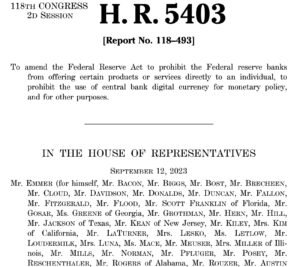US House Takes Bold Steps on Digital Dollar and Crypto Regulation
In a series of impactful legislative moves, the US House of Representatives passed two significant bills aimed at regulating digital currencies and the cryptocurrency market. The CBDC Anti-Surveillance State Act (HR 5403) and the Financial Innovation and Technology for the 21st Century Act (FIT21) highlight ongoing debates about privacy, government control, and the need for a clear regulatory framework for digital assets.

Halting the Digital Dollar: CBDC Anti-Surveillance State Act
The CBDC Anti-Surveillance State Act was passed with a vote of 216 to 192. This legislation restricts the Federal Reserve from issuing a central bank digital currency (CBDC) without explicit authorization from Congress. House Majority Whip Tom Emmer (R-Minn.), the bill’s sponsor, emphasized the potential risks of a digital dollar, arguing it could lead to increased government surveillance and control over personal finances. Former President Trump and the American Bankers Association (ABA) have also expressed concerns, warning that a CBDC could undermine privacy and financial freedom.
Fed Chairman Jerome Powell has assured that the Federal Reserve would not proceed with a CBDC without clear legislative support, indicating that the institution is still in the research phase and has no immediate plans to launch a digital dollar.

Advancing Cryptocurrency Regulation: The FIT21 Act
The House also passed the Financial Innovation and Technology for the 21st Century Act (FIT21) with a vote of 279 to 136. This bill seeks to establish a comprehensive regulatory framework for the cryptocurrency market. It grants the US Commodity Futures Trading Commission more authority over digital assets in spot markets and delineates the Securities and Exchange Commission’s approach to regulating the sector.
The FIT21 Act represents a significant step for the crypto industry, marking the first time a bill focused solely on crypto market regulation has passed the House. However, it faces a challenging path in the Senate, requiring a companion version and undergoing committee revisions. Critics, including Senator Elizabeth Warren, have raised concerns about consumer protections, suggesting that the bill needs further refinement.
Consequences for the Future Crypto Regulation
The approval of these bills by the House highlights the evolving landscape of digital currency regulation in the United States. The CBDC Anti-Surveillance State Act aims to protect privacy and prevent government overreach, reflecting significant Republican concerns. Meanwhile, the FIT21 Act seeks to provide clarity and stability in the rapidly growing crypto market, balancing the need for innovation with consumer protection.
As these bills move to the Senate, their outcomes remain uncertain. The decisions made in the coming months will significantly influence the regulatory environment for digital currencies and the broader financial system in the US, setting important precedents for future legislation.











